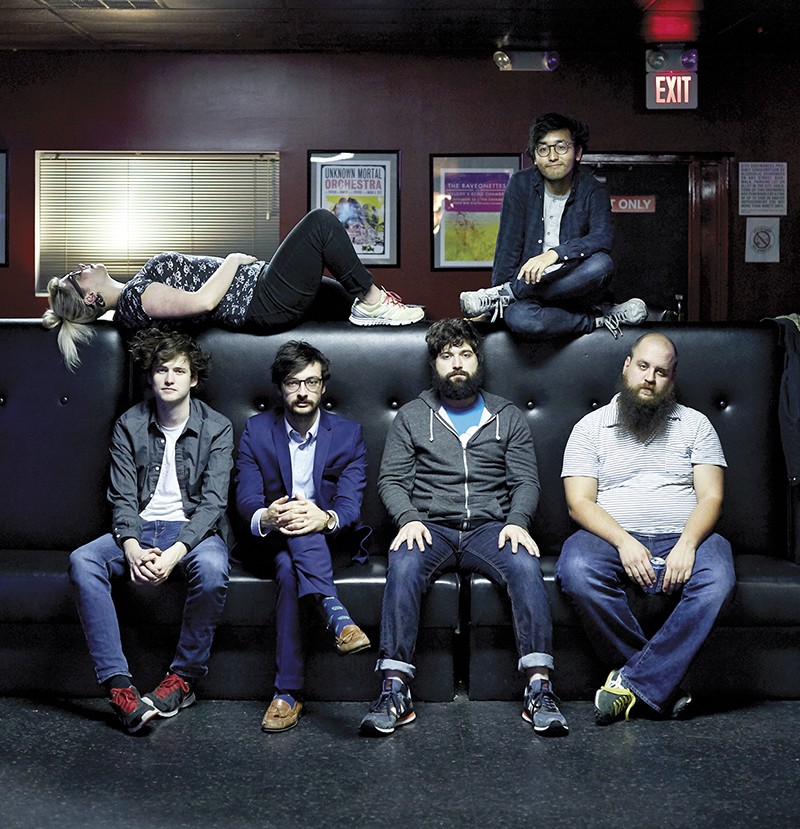Just west of the newly erected IKEA in St. Louis, a billboard looms over Highway 40. In large print the words "Foxing" and "Dealer" accompany an image from the album's cover: two children in a greenhouse overrun with weeds.
A billboard may seem like a strange marketing tactic in an increasingly shrinking music industry, but Dealer is a massive, grandiose record. The band's sophomore album is a dense, exhaustive document of a group wrestling between self-restraint and self-destruction. It is both ambitious and well-executed, and the amount of effort behind it is audible throughout.
Foxing began to write songs for Dealer while the members were home between tours, but finding it hard to focus amid the distractions of outside life. In addition to making up for lost time in their personal relationships, the members sustained themselves with temporary jobs — mostly food service — while not on the road.
"Everything we wrote was born out of negativity," Murphy says. "When you're at practice you're thinking about your girlfriend or work, and afterwards you're thinking about all the dumb fights you had at practice. Every time you play the song, you're reopening that frustration."
"We tried to write together but it was five different ideas and five different opinions, and we ended up writing these songs that we didn't like," guitarist Hudson says. "I kind of said, 'Hey guys, give me a chance on this. I can write out some arrangements, and we'll go from there.'"
To Hudson, writing songs for Dealer also meant figuring out his role in the band. "When I joined, the music was already written and there wasn't much for me to do," he says. "I've always been more interested in songwriting than playing guitar, so I saw this record as an opportunity to prove to myself and the other guys that I care about this band as much as they do."
The band ended up renting a cabin in Vermont for one month, isolating itself. "I think it was the best days of writing that we've ever had, no question," Murphy says. "There's something about staring into the wilderness and thinking about what was going on in your own head. It was inspiring."
The cabin has a different connotation for Hudson. "When I think of the cabin, I don't think of all this great exploration we did that shaped the record. I think of learning how to deal with my own ego and how to be a contributing member of the band without being an asshole."
At one point, the members started to second-guess themselves. "For a little bit there was this paranoia that nobody would like this album unless we made The Albatross Part 2," Hudson says. "Luckily we did not act on that, but there were a few days where we were backtracking on all the progress we made because of that paranoia."
Back in St. Louis, the members had a month before they were slated to record. "We still had so much to do," Murphy says. "Things got a little hairy because everyone had their ideas of what needed to be changed. Some people had thoughts that we needed to scrap entire songs and turn them into something different. There were only a few things that we all agreed on at the end."
For a producer, the band decided on Matt Bayles, best known for his work with Mastodon and Minus the Bear. "We looked at Bayles' discography, and every record he's been a part of has felt massive," Murphy says. "We were making a conscious decision to write more traditionally with choruses and verses, and we thought we could supplement that by working with somebody whose records are always huge sounding."
The admiration went both ways.
"I liked that they were reaching for something," Bayles says from his Seattle studio, Red Room Recording. "I can appreciate any band that doesn't limit themselves to the expectations of what their past indicates."
In May 2015, Foxing drove to the Pacific Northwest to work with Bayles. "It took a few days for us to figure each other out," Bayles says. "They have their own language with each other, and I had to learn how their word might translate to a different word in my world. After we were able to calibrate our communication, things went really well."
"I liked how he would challenge us," Hudson says of Bayles. "He would ask why we were doing something, not because he didn't like it, but just to make sure we had a reason. He made everyone think. If you can't justify why you're playing something, you start to wonder if it's worth doing."
Once the album was finished, the hypercritical band was still uneasy about what it had made. "I knew that if the band made the record they really wanted to make, it would connect with their audience," Triple Crown Records' Fred Feldman says. "One day, Josh Coll told me he had finally sat down and spent some time listening to the record, and he was very proud of it. I knew then that one hurdle was over."
Dealer is a softer, darker, more grown-up version of Foxing. The simple sentiments that defined The Albatross are replaced with deeper musings on God, sex and guilt. Layers of violins, trumpets and mutilated guitars blur into an obscure haze, serving as the perfect backdrop for Murphy and Coll's most thoughtful, devastating lyrics to date.
The reaction to Dealer has been overwhelmingly positive. Songs were premiered in unlikely places (NPR, the Wall Street Journal), while a stream of the full album debuted via Wired. Notoriously cynical Pitchfork Media gave Dealer a score of 7.8 out of 10; Alternative Press awarded it 4 of 5 possible stars.
"Before, I was so nervous that we weren't even going to finish the record," Murphy says. "Once it finally came out, the nervousness focused on how people were going to take it and what the critics are going to think of it.
"Now I wonder if it has staying power. Will people give a shit about it later? The Albatross has been out for two years now, and people still come to shows because of that album. I don't know if this will be the same thing, and that's where my nervousness is now."






